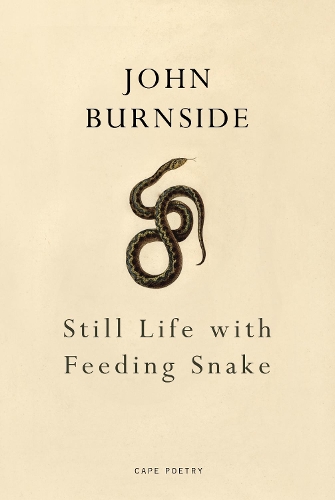
Still Life with Feeding Snake
(Paperback)
Publishing Details
Still Life with Feeding Snake
By (Author) John Burnside
Vintage Publishing
Jonathan Cape Ltd
15th February 2017
2nd February 2017
United Kingdom
Classifications
General
Non Fiction
821.914
Short-listed for The Saltire Scottish Poetry Book of the Year Award 2017 (UK)
Physical Properties
Paperback
104
Width 135mm, Height 200mm, Spine 9mm
123g
Description
The new collection by the prizewinning Scots poet and prose writer From our earliest childhood experiences, we learn to see the world as contested space- a battleground between received ideas, entrenched conventions and myriad Authorised Versions on the one hand, and new discoveries, terrible dangers, and everyday miracles on the other. As we grow, that world expands further, to include new species, lost continents, the realm of the dead and the lives of others- cosmonauts swim in distant space, unseen creatures pass through a garden at dusk; we are surrounded by delectable mysteries. The question of this contested, liminal world sits at the centre of Still Life with Feeding Snake, whose poems live at the edge of loss, or on the cusp of epiphany, always seeking that brief instant of grace when we see what is before us, and not just what we expected to find. In 'Approaching Sixty', the poet watches as a woman unclasps her hair- 'so the nape of her neck/is visible, slender and pale/for moments, before the spill/of light and russet/falls down to her waist'. This, like each poem in the book, becomes an essay in still life and a memento mori, illuminating transient experience with a profound clarity and a charged, sensual beauty.
Reviews
Burnside can describe the material world with astonishing deftness but here, as so often in his writing, the observable facts undergo a series of transformations: into a meditation on separateness, from this to the end of a relationship, and then on to the nature of our eat-or-be-eaten world Musical and memorable, this is echt Burnside. He is the poet who more than any other writing today sees the material world and the world of thought and ideas as two sides of the most fragile of membranes. Few could make the colour blue such a sensuous symbol of slippages of atmosphere or mood Still Life teems with the variety of the world If you have hitherto admired John Burnside in only one genre, now is the time to take the smallest of sideways steps and read both. -- Fiona Sampson * New Statesman *
In John Burnsides latest collection of poetry Still Life with Feeding Snake nothing stays still for very long and every image wrought onto the page is alight with life and movement His signature style and themes are present in his latest work Still Life with Feeding Snake, along with a dose of humour Burnside blends words the way a baker kneads dough he rolls them up, scrunches them together, stretches a string of them to breaking point then folds them into each other to create something else entirely, all the while never moving from that same meditative spot where a little flour has been sprinkled across the table A soulful and meditative collection, Still Life with Feeding Snake is already a 2017 literary highlight. -- India Doyle * Culture Trip *
As a poet, Burnside has peripheral vision: he is always glimpsing other worlds out of the corner of his eye The joy of his poems and part of what makes them moving is that he does know and never stops registering the ways in which beauty makes life worth living. -- Kate Kellaway * Observer *
These poems haul you back to the time when you first realized how alone you were (and are), all the time wondering what to become and how. Burnsides genius is to makes some sense of this pain, for himself and for the reader. This is poetry acting as a scalpel, cutting the heart in order to heal. -- Bel Mooney * Mail *
The world is such a mess. These poems concentrate on stillness, on time that isnt haste. They deliver a zen remedy of calm alert. -- Jeanette Winterson * Guardian *
Author Bio
John Burnside is amongst the most acclaimed writers of his generation. His novels, short stories, poetry and memoirs have won numerous awards, including the Geoffrey Faber Memorial prize, the Whitbread Poetry Award, the Encore Award and the Saltire Scottish Book of the Year. In 2011, Black Cat Bone won both the Forward and the T.S. Eliot Prizes for poetry. A judge for the Booker prize in 2015, he is a professor in the School of English at Saint Andrews University.
